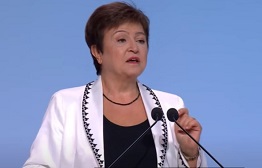By Andualem Sisay Gessesse (Marrakech, Morocco) – The head of the International Monetary Fund (IMF) Ms. Kristalina Georgieva today calls for the need to invest in global cooperation and economic foundations in order to address the pressing issues of the world.
She made the remark speaking at the plenary session of the annual meetings of the IMF/World Bank in Marrakech, Morocco this morning. “…In this vital moment of uncertainty what are the no regret actions that will help us write a better story for the next 50 years…A story of inclusive and sustainable growth for the next 50 years is only possible if we work together…climate and trade are obvious examples,” she said.
“…More than half of low-income countries remain in or at high risk of debt distress. About the fifth of emerging economies face default like spreads. Yes, the Common Framework is starting to deliver on debt restructuring. But it is slow. We need to speedup. The recent Global Sovereign Debt Roundtable established by Indian G-20 Presidency, the IMF and the World Bank is brining all relevant creditors and debtors together. It is showing results and promise for the future,” she said mentioning as an example of what can be done through global cooperation.
In relation to investment in economic foundations, she mentioned the example of Morocco’s government investment in economic foundations that has managed to cope up with the recent earthquake in Marrakech where the annual meetings IMF/WB taking place. “…here in Morocco in the areas devastated by the earthquake it was the buildings with strong foundations and solid structure, which sustained the shocks,” she said, stressing for the need of the sound policies and implementations across every sector.
According to the World Bank President Ajay Banga, who also spoke at the plenary, per capita income Sub Saharan Africa countries remain the same where it was 14 years ago, while the debt burden has increased.

